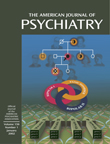[3H]cAMP Binding Sites and Protein Kinase A Activity in the Prefrontal Cortex of Suicide Victims
Abstract
OBJECTIVE: The cAMP-dependent enzyme protein kinase A phosphorylates intracellular proteins upon activation and thereby plays a major role in mediating various physiological functions in the brain. To examine the role of this enzyme in suicidal behavior, the authors examined the catalytic and regulatory activities of protein kinase A in the postmortem brain of suicide victims. METHOD: Brain tissues were collected from 17 suicide victims and 17 nonpsychiatric comparison subjects. Regulatory activity was determined by examining [3H]cAMP binding to protein kinase A, while catalytic activity was determined by enzymatic assay in the presence (total activity) and the absence (endogenous activity) of cAMP in the membrane and cytosol fractions of the prefrontal cortex. RESULTS: The number (Bmax) of [3H]cAMP binding sites to protein kinase A was significantly lower in the suicide victims without any changes in affinity in either the membrane or cytosol fractions of the prefrontal cortex. Further, significantly less protein kinase A activity, both in the presence and the absence of cAMP, was seen in the membrane and cytosol fractions of the prefrontal cortex of suicide victims; however, the difference in total protein kinase A activity was much more pronounced. CONCLUSIONS: The results suggest that cAMP binding to the regulatory subunits of protein kinase A, as well as the phosphotransfer catalytic activity of protein kinase A, are lower in the prefrontal cortex of suicide victims than in nonpsychiatric comparison subjects, which may be of clinical relevance in the pathophysiology of suicidal behavior.



